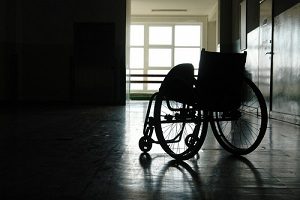Under Cover of Pandemic, Nursing Home Residents Illegally Evicted

“It felt opportunistic, where some homes were basically seizing the moment when everyone is looking the other way to move people out.” (Laurie Facciarossa Brewer, long-term care ombudsman in New Jersey). With nursing homes involved in more than 40% of coronavirus deaths, in depth reporting by Jessica Silver-Greenberg and Amy Julia Harris at the New York Times reveals a new threat to residents’ care and safety: unlawful evictions of disabled and old persons to unlicensed facilities, rundown motels, homeless shelters, or other unsafe sites.
Nursing homes that wish to discharge residents against their wishes must provide written notice to the resident and representatives, assistance with trouble-shooting and an appeal, help with applying for government health-insurance coverage, and appropriate discharge planning. The NYT reporters learned from ombudsmen, elder care attorneys, social workers, and former facility executives that instead of meeting these obligations, facilities worked around the legal requirements by effecting so-called “voluntary” discharges: verbally informing residents that they will need to leave and pressuring them to do so because they must “make way” for Covid-19 patients. With “voluntary” discharges, the patients are not told of their choices and rights, written notice is not provided, and the family members and ombudsman are not informed.
Some discharged patients suffer from dementia, mental illness, or have disabilities that prevent them from safely relocating. Ombudsmen and elder care attorneys are successful at stopping some unsafe discharges if they find out about them in time, but it’s not always possible. Many such patients become lost or on the streets and end up in the emergency room. In the pandemic overall accountability has taken a significant hit: ombudsmen and families are restricted from the sites, routine inspections are halted, and facility operators have had some success in seeking immunity.
The reason for these evictions appears to be money: long-term care facilities have been asked to take on Covid-19 patient overflow from hospitals. Medicare or private insurance reimbursement for coronavirus-recovery patients is incredibly lucrative, the NYT article cites at least $600 more per day than Medicaid reimbursement rates for typical residents. Facilities have seized on this payment differential given the financial hit taken from lost revenues typically received from largely halted shorter-term post-surgery rehabilitation stays.
Two nursing homes cited in the article, Lakeview Terrace in Los Angeles and Rockport Healthcare Services, have previous records of accusations of illegal discharges. A Rockport executive wrote an email urging “discharge planning immediately” in the midst of the pandemic, which a former CEO confirmed meant replacing “the poorest, least profitable patients with the highest paying ones.” Lakeview Terrace was undergoing active monitoring pursuant to prior charges, but the monitor could not visit the site during the coronavirus shutdown.
The law requires notices of discharge to be provided to the resident and the resident’s representative or ombudsman. The notice must be in writing, usually with 30 days’ notice to give the resident time to appeal, which is a right. Involuntary discharges may only occur for valid specified reasons, which must be specified in the notice. The facility is required to provide social services such as helping to complete and file any appeal request, attempting to solve the underlying problem cited for the discharge, and discharge planning services. The notice also must specify the date of discharge and the specific site of relocation, which must be safe, appropriate, available, and agreeable to the admission. In the best cases, such sites may be appropriate assisted living or even an apartment. Residents have the right to participate in discharge planning, including preparations for care and medication, and new home orientation.
The failure properly to handle discharges could result in government healthcare programs paying false claims for residents that did not receive appropriate services and care, including: discharge planning and social-work services, and false certifications of compliance with Medicaid laws and regulations intended to protect residents from unfair and unsafe evictions.
In 2018, a former nursing home operator of 5 facilities in Maryland was permanently barred from further operations and paid millions to settle charges that it attempted wrongly to evict hundreds of residents to unlicensed, predatory, or unsafe shelters to make more money. In some cases, the operator evicted the patients for “failure to pay” but unlawfully failed to inform and assist the patient to seek Medicaid reimbursement. Yet following eviction, the operator secured Medicaid reimbursement after the fact and failed to tell Medicaid that it had earlier evicted the patients. The state’s charges included violation of the state’s False Claims Act because the facility operator sought Medicaid reimbursement for services while falsely certifying that it complied with important legal and contractual requirements protecting patients’ rights.
If you have evidence about nursing home fraud and are considering blowing the whistle about it, please Contact Us. To read more:
- Let’s Talk about Nursing Homes – Who Will Raise the Red Flag Now That Routine Inspections Are Halted?
- Private Equity Ownership of Nursing Homes Might Have Made Everything Worse
- Increased Federal Funds, Incentives, and Requirements for Nursing Homes Brings Worrisome Opportunities for Fraud
- Whistleblowers Are Critical to Exposing Fraud in the Murky World of For-Profit and Private-Equity Nursing Home Operations
- Healthcare and Pharmaceutical Fraud
- The COVID-19 Crisis, Whistleblowers, and the Constantine Cannon Whistleblower Team
- I Might Have a Whistleblower Case
- Whistleblower FAQs
- Constantine Cannon whistleblower representation
Tagged in: CC Lawyers, COVID-19, FCA Federal, Healthcare Fraud, Importance of Whistleblowers, Provider Fraud, SNF,